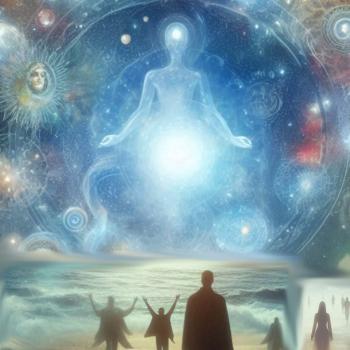Series: The Big Questions
Who is God? This is a fun question. I research and write about “the nature (ontology) of God, and explored it through the literature of many religions.

Proof
Proof of God is an unproven hypothesis. Like love, you can’t put God under a microscope and declare that God is or isn’t, or just reach out and touch God.
For that reason the hard sciences, which look for enigmatic things like particles, energy fields, radiation, and black holes, leave many in those fields thinking that God doesn’t exist. But that’s a bias. they have no trouble speculating and looking for dark energy and dark matter for which there is no empirical evidence, just some observational data that suggests it exists. Scientists don’t know what 90% of the universe is made of. You have to take scientific opinion on this with a grain of salt.
The First Cause philosophical argument implies that something didn’t come from nothing, so before the Big Bang or any idea of creation there was God bringing the physical universe into existence.
The ancient Canaanites believed that if you saw God you would die. This is also seen in ancient Judaism.
God can’t be disproven. Nor can God be proven in a scientific way.
God is experiential
Scientists wonder what love is. They can see some effects on the brain which is an implication of love, and they can see behavior which is an implication of love, but they can’t see it or touch it. It’s a bit like a magnetic field but unlike a magnetic field can’t be measured or repeated. Yet we have strong belief that love exists. We know love exists because of experience. It’s one of the most powerful influences in the universe, if not the most powerful.
For some the believe God exists because a religion says that God does. For some God is a convenient crutch for avoiding personal responsibility for their lives or actions. For some God is the explanation for things that defy explanation.
For many God exists because of experience. This is the basis of faith. People believe that God is love, God is benevolent toward them, God’s ways work best in their lives, and so they have experience that exists.
Some believe that God is the universal consciousness which is part of all of us. That would fit with God is love an is in each of us.
The deeply religious Christian mystic (psychic) Edgar Cayce said: “God is essentially love and the Universe is completely orderly.” He also said: “… in the beginning there was a sea of spirit, and it filled all space. It was static, content, aware of itself, a giant resting on the bosom of its thought, contemplating that which it was …. God desired to express Himself, and He desired companionship. Therefore, He projected from Himself the cosmos and souls.” – The Edgar Cayce Philosophy
Well, some prefer to see God as a figure sitting on a throne of judgment. So who God is depends on the interpretive context of the speaker.
Some think God is feminine, some masculine. Some think gender is beyond God. We don’t know. Christians believe that we are made in God’s image. That probably doesn’t mean physical image but spiritual.
Faith is trust in God. Most Biblical passages about faith involve trust.
In the Bible when God spoke to Moses he didn’t give a name. God said, “I am.” Perhaps that says it all. Jesus called God, Abba, meaning Father, or the more general term Allah.
History
Most religions have a belief in a creator God, most powerful God, most high God. In that sense there is but one God.
Many religions believe that God can be represented in our world by a figure that is like God. In that sense God is represented by an avatar. This could also be called a manifestation, incarnation, or embodiment. Christians believe that God is represented by Jesus the Christ. Hindus believe that there are many manifestations of God. Incarnation means to embody in the flesh.
Expectations of God
Perhaps the reason so many people doubt that there is a God is because they have expectations about God that don’t get fulfilled.
On the one hand civilizations sometimes sacrificed people to get in God’s good graces. On the other hand Judaism had many practices meant to put them in a favorable position with God, including 613 laws plus the Traditions of the Fathers, and maybe the secrets of the Cabala.
Jews and Christians have contracts with God called covenants. Certain expectations were defined. For Christians this covenant was love.
Many expect that God will intervene in the physical universe and are disappointed when this doesn’t happen, and this often causes disbelief. They wonder how God could let bad things happen. There is very little evidence for this expectation.
Religious groups also often set expectations about God. They focus on the aspects of all knowing and all powerful.
I believe that God created the universe to do what it does as a place where people can show who they are and become better. That means people hurt each other. It also means that things that happen in the physical universe, such as weather, disease, and earthquakes, are simply the world we live in. God doesn’t micromanage the universe. Yet prayer has been shown to work in scientific studies.
God is love
Jesus and the apostles emphasized love of others as God has shown love toward us. Even the prophets of Israel had similar thoughts. When we love our neighbors we get better results for them and us – better relationships. Better relationships lead to improved lives and improved prosperity. The Buddha also emphasized love. Most religions emphasize love.
If I had to define God, or describe God, I would simply say that God is love and expects the same from us.
Jesus said that God is spirit. That’s another discussion, Part 2.
Takeaway
Are we able to fathom something as complex as God? Probably not. Even love is difficult for us to comprehend – we understand very little about it.
People who make pronouncements about God most likely are speaking from their interpretive perspective such as science or some religious teaching. They don’t actually know.
God is generally understood through experience. If we don’t try to experience God over a long period of time then we likely won’t.
I think it’s best just to understand God is love and expects us to love others. We can’t go wrong with that.
Series Links:
________________________
The standard of belief and conduct for Christianity is love. God is love. We’re asked to be like God.
________________________
If you find these articles intriguing, please consider joining the mailing list.
If I’ve challenged your thinking, I’ve done my job.
___________________
Our answer is God. God’s answer is us. Together we make the world better.
– Dorian












